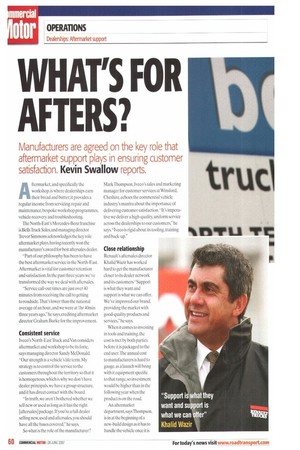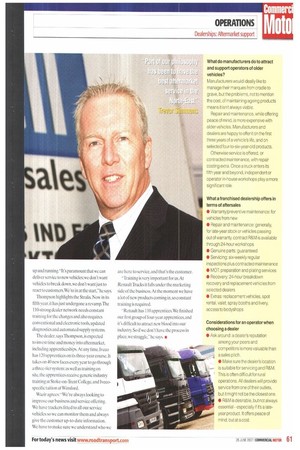WHAT'S FOR AFTERS?
Page 60

Page 61

If you've noticed an error in this article please click here to report it so we can fix it.
Manufacturers are agreed on the key role that
aftermarket support plays in ensuring customer
satisfaction. Kevin Swallow reports.
Aftermarket, and specifically the workshop, is where dealerships earn their bread and butter; it provides a regular income from servicing, repair and maintenance, bespoke workshop programmes, vehicle recovery and troubleshooting.
The North-East's Mercedes-Benz franchise is Bells Truck Sales, and managing director Trevor Simmons acknowledges the key role aftermarket plays. having recently won the manufacturer's award for best aftersales dealer.
"Part of our philosophy has been to have the best aftermarket service in the North-East. Afterrnarket is vital for customer retention and satisfaction. In the past three years we've transformed the way we deal with aftersalcs.
"Service call-out times are just over 40 minutes from receiving the call to getting to roadside. That's lower than the national average of an hour, and we were at 1hr 40min three years ago," he says.crediting aftermarket director Graham Burke for the improvement.
Consistent service
Iveco's North-East Truck and Van considers aftermarket and workshop to be its forte, says managing director Sandy McDonald. "Our strength is a vehicle's life term. My strategy is to control the service to the customers throughout the territory so that it is homogenous, which is why we don't have dealer principals, we have a group structure, and it has direct contact with the board.
"In truth, we aren't bothered whether we sell new or used as long as it has the right [aftersales] package. If you're a full dealer selling new, used and aftersales, you should have all the bases covered." he says.
So what is the role of the manufacturer? Mark Thompson, lveco's sales and marketing manager for customer services at Winsford, Cheshire, echoes the commercial vehicle industry's mantra about the importance of delivering customer satisfaction. "It's imperative we deliver a high-quality, uniform service across the dealerships to our customers," he says."Iveco is rigid about its tooling, training and hack -up."
Close relationship
Renault's aftersales director Khalid Wazir has worked hard to get the manufacturer closer to its dealer network and its customers. Support is what they want and support is what we can offer. We've improved our brand, providing the market with good-quality products and services," he says.
When it comes to investing in tools and training, the cost is met by both parties before it is packaged to the end user.The annual cost to manufacturers is hard to gauge, as a launch will bring with it equipment specific to that range, so investment would be higher than in the following year when the product is on the road.
An aftermarket department,says Thompson, is in at the beginning of a new-build design as it has to handle the vehicle once it is up and running."It's paramount that we can deliver service to new vehicles: we don't want vehicles to break down,we don't want just to react to customers. We're in at the start," he says.
Thompson highlights the Stralis. Now in its fifth year. it has just undergone a revamp.The 110-strong dealer network needs constant training for the changes and also requires conventional and electronic tools, updated diagnostics and automated supply systems.
The dealer. says Thompson, is expected to invest time and money into aftermarket, including apprenticeships. At any time, Iveco has 120 apprentices on its three-year course. It takes on 40 new faces every year to go through a three-tier system: as well as training on site, the apprentices receive generic industry training at Stoke-on-Trent College, and Ivecospecific tuition at Winsford.
Wazir agrees: "We're always looking to improve our business and service offering. We have trackers fitted to all our service vehicles so we can monitor them and always give the customer up-to-date information. We have to make sure we understand who we are here to service, and that's the customer.
"Training is very important for us. At Renault Trucks it falls under the marketing side of the business. At the moment we have a lot of new products coming in,so constant training is required.
"Renault has 110 apprentices.We finished our first group of four-year apprentices, and it's difficult to attract new blood into our industry. So if we don't have the process in place. we struggle," he says. •






























































































































































































